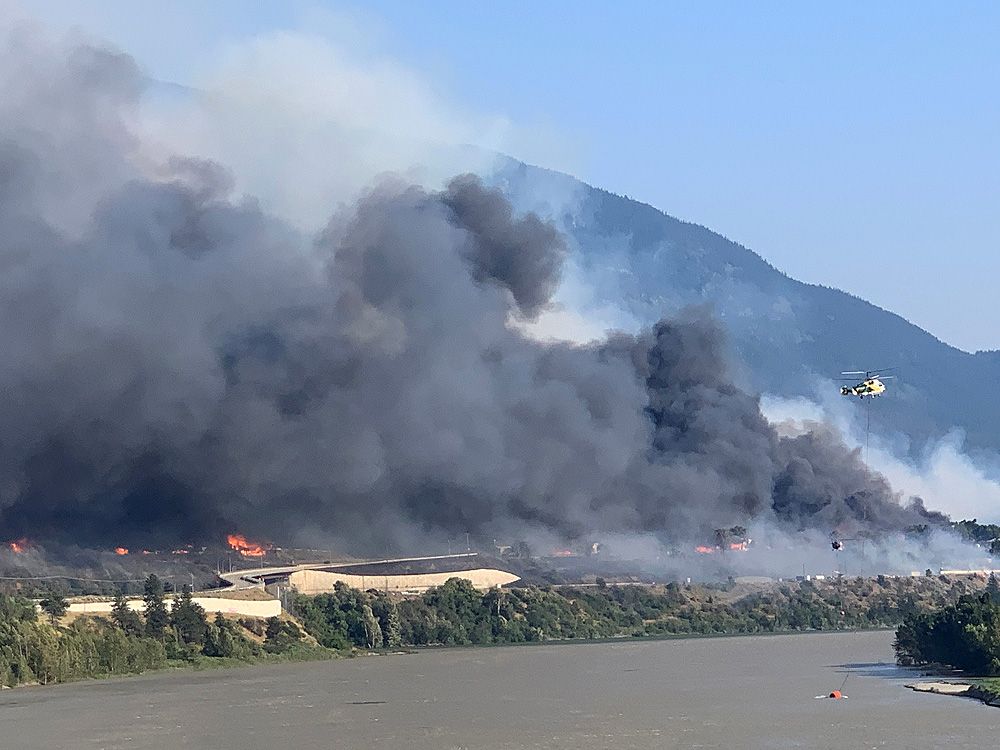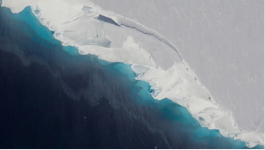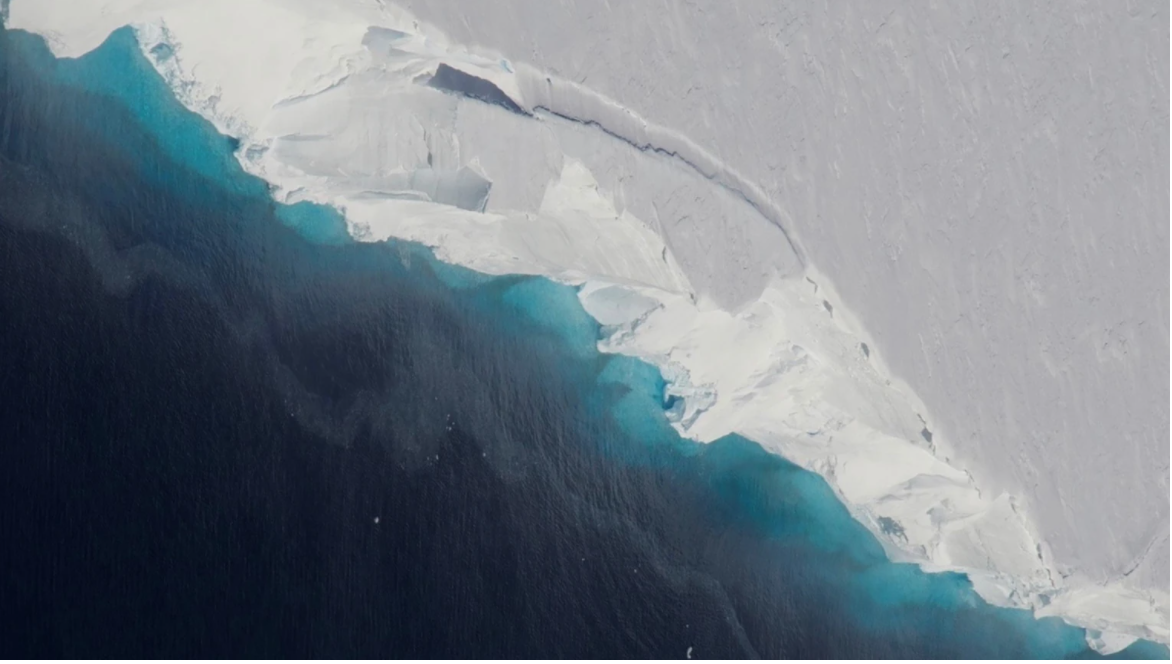'Trying to tell us something': Climatologist says 2021 a weather year like no other
Author of the article:
Canadian Press
Canadian Press
Bob Weber
Publishing date:
Dec 16, 2021 • 8 hours ago • 5 minute read •
8 Comments
Smoke rises above the town after wildfires forced its residents to evacuate, in Lytton, British Columbia, June 30, 2021.
Smoke rises above the town after wildfires forced its residents to evacuate, in Lytton, British Columbia, June 30, 2021. Photo by JR Adams /Handout via REUTERS
Article content
When Dave Phillips, Environment Canada’s senior climatologist, began 26 years ago compiling his annual list of the country’s Top 10 weather events, he sometimes had to stretch a bit.
Advertisement
Story continues below
Article content
“One of the big stories was, ‘Hey, it was a good recreation season, skiers loved it,”‘ he recalls.
Searching for weather events was not a problem in 2021.
“This year was beyond belief. There’s no year in the 26 years that could compare to this year.”
There are no happy visions of snow-covered slopes on the 2021 list. Just death, destruction and drought.
Consider late June’s heat dome in Western Canada, the top pick by Phillips for the year.
The record temperature of nearly 50 C at Lytton, British Columbia, was well-publicized — as was the village’s destruction in an ensuing wildfire. But Lytton was only one of six communities that surpassed Canada’s previous all-time high temperature that day.
Local records melted like Popsicles. About 1,000 new daily temperature marks were set between June 24 to July 4.
Advertisement
Story continues below
Article content
Heat was a factor in 600 deaths in Vancouver and in another 185 in Alberta. More than 650,000 farm animals perished, despite desperate measures such as chicken farmers spraying their barns with water.
Floods? November gave a sinister new cast to the old gibe of calling B.C. the “wet coast” for the second ranked weather event of 2021.
Some places got 30 centimetres of rain over three days. Forty daily rainfall records fell with totals experienced only once every 100 years.
Saturated mountainsides collapsed. The Fraser Valley flooded, along with several towns and cities. Major highways washed away like sandcastles.
More than 14,000 people were evacuated, including the entire population of Merritt. Four people died and one was missing.
Advertisement
Story continues below
Article content
B.C. wasn’t the only province afflicted. Much of the Prairies suffered through another drought year that historians compared to the Dirty ’30s.
Edmonton had its second driest winter in 136 years, while Calgary’s spring rain was less than half of normal. Southern Manitoba was Canada’s drought epicentre, where places like Winnipeg had their two driest back-to-back years in more than a century.
Both wheat and canola production were down by a third. Hay crops were as little as 10% of normal.
Heat plus drought also equalled wildfires across the country.
B.C. saw almost 60 times more forest burned this year than in 2020 and the third most area ever. The smoke spread to Alberta, where Calgary recorded 512 hours of smoke and haze — more than 40 times the average and enough to cancel chuckwagon races at the Stampede.
Advertisement
Story continues below
Article content
Ontario called 2021 its worst fire season on record, with 50% more fires than the 10-year average and five times the area burned. More than 3,000 people were evacuated from First Nations communities.
The list goes on.
Tornadoes powerful enough to push homes off their foundations whipped repeatedly through Ontario and Quebec. One of them killed a man in Mascouche, Que., which saw winds up to 200 km/h.
In February, an arctic blast turned the Prairies gelid with record low temperatures. On Feb. 13, Winnipeg’s -38.8 C was colder than the summit of Mt. Everest. In Edmonton, pucks at outdoor hockey games shattered when they hit goalposts.
Newfoundland battened down for Hurricane Larry, which hit Sept. 11 with winds gusting up to 180 km/h. Larry poured rain, toppled trees, flung roofs and knocked out power to 60,000 people.
Advertisement
Story continues below
Article content
In all, 2021 was enough to leave a normally eloquent climatologist grasping for superlatives.
“It just is mind-boggling,” said Phillips.
This year showed how climate change can exaggerate and extenuate the normal extremes of Canadian weather into dangerous and destructive events, he said.
“What I’m hopeful for is that it becomes the turning point and confirmation for the majority of Canadians that there’s clear and present danger to climate change and extreme weather,” he said. “This year has really woken people up to that fact.”
If there’s a lesson to 2021’s weather, it’s that Canada’s buildings, roads and bridges were built for a climate that no longer exists. This year, said Phillips, may be a foretaste of what’s to come.
Advertisement
Story continues below
Article content
“I’m worried,” he said.
“It’s kind of scary to think that what occurred in 2021 would be called ho-hum in 2050. This just may be what’s going to be more normal-like in the years to come.
“Nature’s trying to tell us something.”
A list of Canada’s Top 10 weather events in 2021
Dave Phillips, senior climatologist with Environment Canada, has been compiling a Top 10 list of Canada’s weather events for more than two decades. Here are his picks for 2021:
1. Heat dome in Western Canada: At the end of June, a sprawling high-pressure ridge with incredible strength, height, scope and persistence compressed air enough to cook the atmosphere and dissipate clouds. Lytton, B.C., set an all-time Canadian high of 49.6 C. Days later, the town was destroyed in a wildfire.
Advertisement
Story continues below
Article content
2. Flooding in British Columbia: Nearly a month’s worth of rain poured into the Fraser Valley over one November weekend, flooding farms and nearly paralyzing Canada’s east-west traffic as it washed out major highways.
3. Drought: Years of dry weather culminated in drought across much of Canada’s agriculture belt. At one point, about 99% of the Prairies grain region was classified as a drought scene.
4. Wildfires: Heat plus drought equaled a wildfire season that burned out of control across Canada this year. B.C. saw forests burned equal to 1.5 times the size of Prince Edward Island. By July 10, fires were out-of-control in every province and territory except for Atlantic Canada and Nunavut.
5. Heat waves: Canada rode out four heat waves in the summer, the fifth warmest season in the past 74 years. Montreal had its warmest August in 150 years, while nighttime temperatures in cities including Toronto remained over 20 C — and humid.
Advertisement
Story continues below
Article content
6. Tornadoes: Tornadoes strong enough to shift homes and lift cars tore repeatedly through Ontario and Quebec in June and July, killing a man in a town north of Montreal.
7. Arctic blast: February saw every part of Canada from Victoria to St. John’s under freezing conditions — some of them extreme. Nighttime windchills on the Prairies sank the temperature to -55 C.
8. Calgary hailstorm: A 20-minute hailstorm on July 2 saw ice pellets ranging in size from dimes to golf balls, part of a storm that caused local flooding and 200 calls to emergency services over two hours.
9. Hurricane Larry: More than 60,000 Newfoundlanders lost power when Larry roared ashore on Sept. 11 with winds of up to 180 km/h and heavy rains. Coastal infrastructure was damaged and roads were closed for days.
10. Prairie Clipper: Winds in January recorded at least 100 km/h in 76 different locations, 13 of which set records. There may have been more, but winds blew away measuring equipment.
When Dave Phillips, Environment Canada’s senior climatologist, began 26 years ago compiling his annual list of the country’s Top 10 weather events, he sometimes had…

torontosun.com






